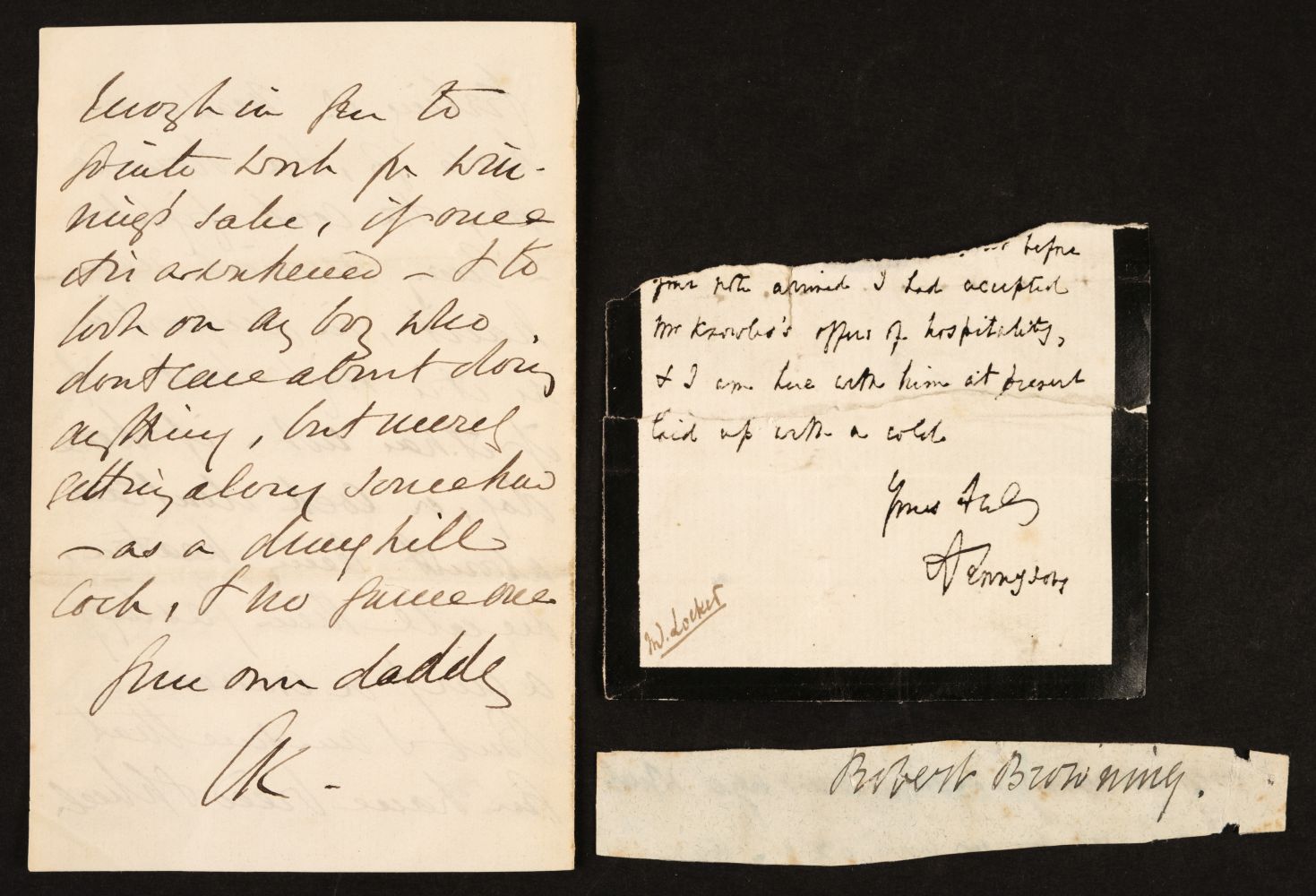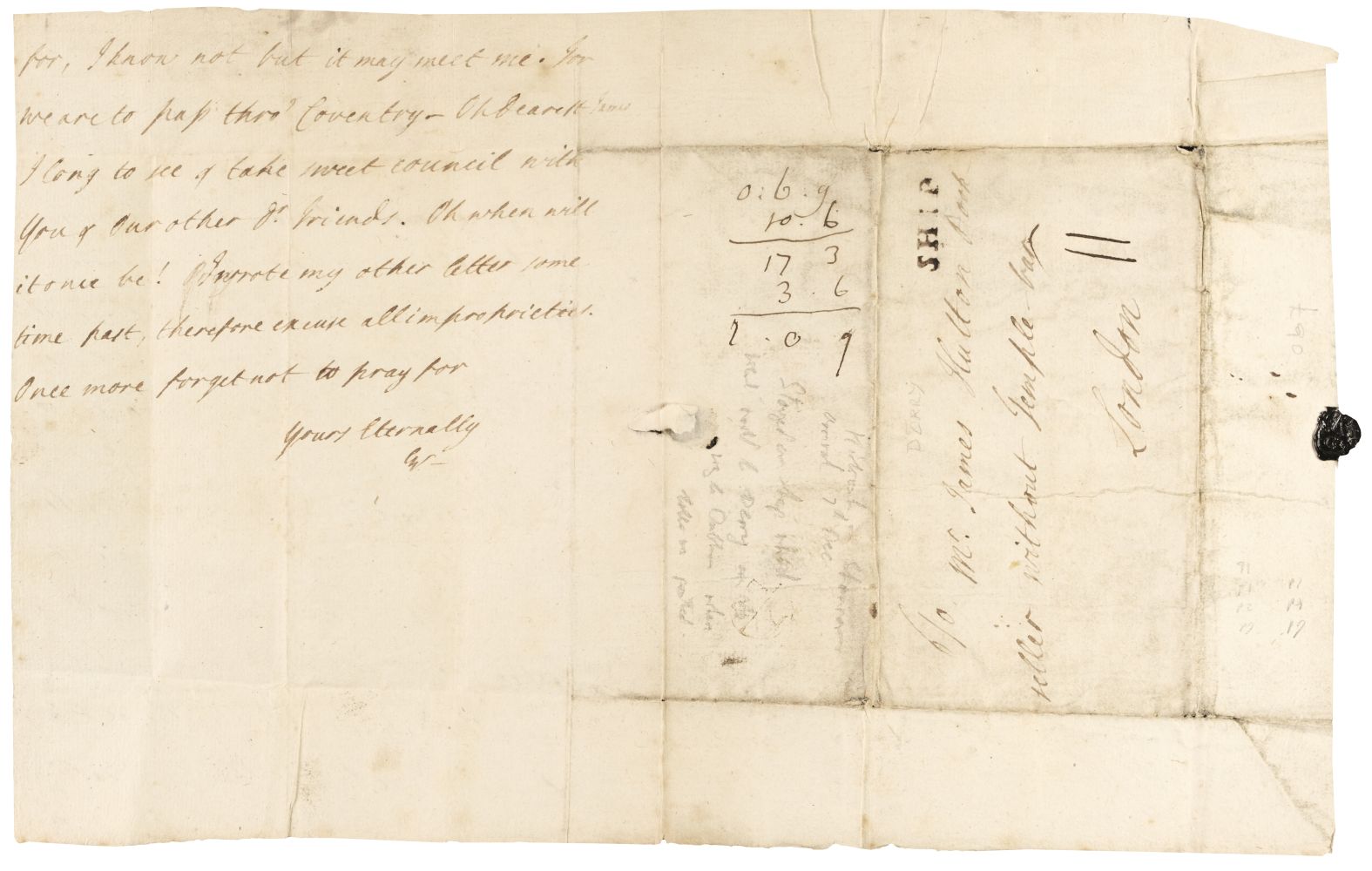Title: Autograph letter, signed with her initial, from the first woman doctor in America, and a teacher to slave children in North Carolina Author: Blackwell, Elizabeth Place: Asheville, NC Publisher: Date: August 2, [1845] Description: 4pp., including stampless address leaf. To her brother S[amuel] C. Blackwell, Cincinnati, Ohio. Four years after she wrote this letter, Elizabeth Blackwell would make history as the first woman to receive a Medical degree in America. The “obsessive challenge” of becoming a Doctor was already fixed in the mind of the young woman of 24, who, to make money for college and mark time, left her family in Ohio to teach at a small academy in Asheville, North Carolina. After a month in Asheville, she wrote this typically witty letter of some 2000 words to her brother Sam - future husband of Antoinette Brown, the first American woman to be ordained a Protestant minister - painting a vivid picture of her life in a small southern city, a difficult adjustment given the anti-slavery fervor she shared with all her family. She had been moved by a “very sober straightforward” newspaper account of an American “colored man” who had emigrated to Liberia, being “with difficulty induced to go there, having received a strong prejudice against the colony, but was now very happy, had a feeling of independence, that he never could gain in America, wanted his sisters to join him and was rejoicing in the prospect of spending his life in spreading religion and civilization among his African brethren…”. And, while living in Dixie, she was resolved to make her own personal contribution to the anti-slavery cause - “The day before yesterday, I established a day school for free colored children. It was with a thrill of deep pleasure that I put a new spelling book into their hands, and resolved that spite of legal restrictions and social prejudices, they should become truly free intelligent citizens, as far as my power of making them such extended – so the five school days of the week, you may think of me, from four to five o’clock, teaching with the utmost zeal in that little frame building behind the Methodist church, the first school house, you remember, erected in Asheville, and certainly no class of white children, in North or South, has a more determined-to-teach instructress than that small number of oppressed black Carolinians. You may also think of me, from three to four on Sunday afternoons, engaged in the task, less pleasing, and of which I am half ashamed, of endeavoring to give religious instruction to slaves.” She was soon to be disappointed in this “zeal” because southern laws and custom prevented Negroes, slave or free, from being taught to read, and even the Negro Sunday School she started with four local ladies grew intolerable because of the race prejudices of her fellow teachers. On more mundane matters, being “horrified” by her “ravenous” appetite (“every time I look in the glass, it seems to me I’m growing stouter”), as a “preventive”, Blackwell vigorously pursued “mental and bodily activity…I fill my room with books and read as many as possible. I go to bed at ten and get up at five and every evening at dusk, I walk six times round the grove, at such a pace that it…blows the leaves of the bushes as if a hurricane were rushing by…” Though as an unmarried woman, she had an eye out for “small flirtations” which “add decidedly to the interest of a place…just piquant enough to give excitement to leisure moments”, she had “not been captivated by any gentleman”, the town being filled with “country people” who “took pleasure in intoxicating the Negro boys, in loafing about, shouting and screaming”, while even the lawyers she had met were “fat, red faced, loud voiced fellows, full of themselves”. In any case, she had no interest in any romance that would “interrupt the serious business of life”, defying “reason and common sense” and requiring “excruciating pangs” to untangle. Besides, Blackwell
Title: Autograph letter, signed with her initial, from the first woman doctor in America, and a teacher to slave children in North Carolina Author: Blackwell, Elizabeth Place: Asheville, NC Publisher: Date: August 2, [1845] Description: 4pp., including stampless address leaf. To her brother S[amuel] C. Blackwell, Cincinnati, Ohio. Four years after she wrote this letter, Elizabeth Blackwell would make history as the first woman to receive a Medical degree in America. The “obsessive challenge” of becoming a Doctor was already fixed in the mind of the young woman of 24, who, to make money for college and mark time, left her family in Ohio to teach at a small academy in Asheville, North Carolina. After a month in Asheville, she wrote this typically witty letter of some 2000 words to her brother Sam - future husband of Antoinette Brown, the first American woman to be ordained a Protestant minister - painting a vivid picture of her life in a small southern city, a difficult adjustment given the anti-slavery fervor she shared with all her family. She had been moved by a “very sober straightforward” newspaper account of an American “colored man” who had emigrated to Liberia, being “with difficulty induced to go there, having received a strong prejudice against the colony, but was now very happy, had a feeling of independence, that he never could gain in America, wanted his sisters to join him and was rejoicing in the prospect of spending his life in spreading religion and civilization among his African brethren…”. And, while living in Dixie, she was resolved to make her own personal contribution to the anti-slavery cause - “The day before yesterday, I established a day school for free colored children. It was with a thrill of deep pleasure that I put a new spelling book into their hands, and resolved that spite of legal restrictions and social prejudices, they should become truly free intelligent citizens, as far as my power of making them such extended – so the five school days of the week, you may think of me, from four to five o’clock, teaching with the utmost zeal in that little frame building behind the Methodist church, the first school house, you remember, erected in Asheville, and certainly no class of white children, in North or South, has a more determined-to-teach instructress than that small number of oppressed black Carolinians. You may also think of me, from three to four on Sunday afternoons, engaged in the task, less pleasing, and of which I am half ashamed, of endeavoring to give religious instruction to slaves.” She was soon to be disappointed in this “zeal” because southern laws and custom prevented Negroes, slave or free, from being taught to read, and even the Negro Sunday School she started with four local ladies grew intolerable because of the race prejudices of her fellow teachers. On more mundane matters, being “horrified” by her “ravenous” appetite (“every time I look in the glass, it seems to me I’m growing stouter”), as a “preventive”, Blackwell vigorously pursued “mental and bodily activity…I fill my room with books and read as many as possible. I go to bed at ten and get up at five and every evening at dusk, I walk six times round the grove, at such a pace that it…blows the leaves of the bushes as if a hurricane were rushing by…” Though as an unmarried woman, she had an eye out for “small flirtations” which “add decidedly to the interest of a place…just piquant enough to give excitement to leisure moments”, she had “not been captivated by any gentleman”, the town being filled with “country people” who “took pleasure in intoxicating the Negro boys, in loafing about, shouting and screaming”, while even the lawyers she had met were “fat, red faced, loud voiced fellows, full of themselves”. In any case, she had no interest in any romance that would “interrupt the serious business of life”, defying “reason and common sense” and requiring “excruciating pangs” to untangle. Besides, Blackwell















Try LotSearch and its premium features for 7 days - without any costs!
Be notified automatically about new items in upcoming auctions.
Create an alert